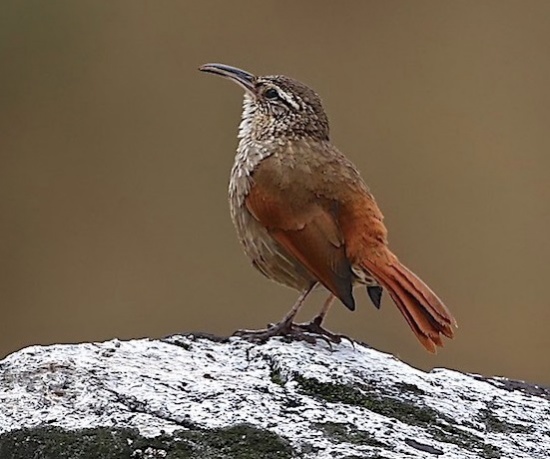(Picture added) |
(Imp sizes. Basic tidy-up. References updated. GSearch amended to allow for both scientific names) |
||
| Line 3: | Line 3: | ||
''Upucerthia serrana''<sup>[[#References|[2]]][[#References|[5]]]</sup> | ''Upucerthia serrana''<sup>[[#References|[2]]][[#References|[5]]]</sup> | ||
==Identification== | ==Identification== | ||
| − | Most of the body is greyish to greyish-brown, paler on underside than upperside, with pale shaft-streaks. Throat is pale as is the [[Topography#Heads|supercilium]] which is more noticeable behind than in front of eye. Wings and tail rufous. Bill is long, somewhat decurved, and mostly black, yellow at base of lower mandible. Legs and eye | + | 19–20 cm (7½-7¾ in)<br /> |
| + | Most of the body is greyish to greyish-brown, paler on underside than upperside, with pale shaft-streaks. Throat is pale as is the [[Topography#Heads|supercilium]] which is more noticeable behind than in front of eye.<br /> | ||
| + | Wings and tail rufous. Bill is long, somewhat decurved, and mostly black, yellow at base of lower mandible.<br /> | ||
| + | Legs and eye are dark. | ||
==Distribution== | ==Distribution== | ||
| − | [[Peru]]. | + | [[South America]]: found only in [[Peru]]. |
==Taxonomy== | ==Taxonomy== | ||
The move from the genus [[:Category:Upucerthia|Upucerthia]] to genus [[:Category:Geocerthia|Geocerthia]] is recognised by Clements (2010)<sup>[[#References|[1]]]</sup> and Gill and Donsker (2010)<sup>[[#References|[3]]]</sup>. | The move from the genus [[:Category:Upucerthia|Upucerthia]] to genus [[:Category:Geocerthia|Geocerthia]] is recognised by Clements (2010)<sup>[[#References|[1]]]</sup> and Gill and Donsker (2010)<sup>[[#References|[3]]]</sup>. | ||
| Line 16: | Line 19: | ||
==Habitat== | ==Habitat== | ||
| − | Polylepis forest patches and high-altitude rock-filled shrubland. | + | Polylepis forest patches and high-altitude rock-filled shrubland. Also observed at heights around 4,450 m in puna grassland. |
==Behaviour== | ==Behaviour== | ||
Mostly seen on ground, often with tail angled upwards. | Mostly seen on ground, often with tail angled upwards. | ||
| − | + | ====Diet==== | |
| − | The diet | + | The diet consists mostly of arthropods, including insects. |
==References== | ==References== | ||
| − | #{{Ref- | + | #{{Ref-Clements6thAug17}}#{{Ref-HM03Cor7}}#{{Ref-GillDonsker10}}#Ridgely and Tudor 2009. Field guide to the songbirds of South America - the passerines. University of Texas Press, Austin, TX, USA. ISBN 978-0-292-71979-8 |
| − | #{{Ref-SibleyMonroe96}} | + | #{{Ref-SibleyMonroe96}}#Handbook of the Birds of the World Alive (retrieved Nov 2017) |
| − | + | #BF Member observations | |
| + | {{ref}} | ||
==External Links== | ==External Links== | ||
[http://birdforum.net/showthread.php?t=150134 Birdforum thread] discussing the genus ''Geocerthia'' | [http://birdforum.net/showthread.php?t=150134 Birdforum thread] discussing the genus ''Geocerthia'' | ||
| − | {{GSearch| | + | {{GSearch|earthcreeper+serrana}} |
[[Category:Birds]] [[Category:Geocerthia]] | [[Category:Birds]] [[Category:Geocerthia]] | ||
Latest revision as of 00:04, 24 November 2017

Photo by Stanley Jones
Cordillera Blancas, Huascarán National Park, Yungay, Ancash, Peru, August 2017
- Geocerthia serrana
Identification
19–20 cm (7½-7¾ in)
Most of the body is greyish to greyish-brown, paler on underside than upperside, with pale shaft-streaks. Throat is pale as is the supercilium which is more noticeable behind than in front of eye.
Wings and tail rufous. Bill is long, somewhat decurved, and mostly black, yellow at base of lower mandible.
Legs and eye are dark.
Distribution
South America: found only in Peru.
Taxonomy
The move from the genus Upucerthia to genus Geocerthia is recognised by Clements (2010)[1] and Gill and Donsker (2010)[3].
Two subspecies are recognized:[1]
- G. s. serrana
- Andes of Peru (Cajamarca to Lima)
- G. s. huancavelicae
- Andes of south-western Peru (Huancavelica)
Habitat
Polylepis forest patches and high-altitude rock-filled shrubland. Also observed at heights around 4,450 m in puna grassland.
Behaviour
Mostly seen on ground, often with tail angled upwards.
Diet
The diet consists mostly of arthropods, including insects.
References
- Clements, J. F., T. S. Schulenberg, M. J. Iliff, D. Roberson, T. A. Fredericks, B. L. Sullivan, and C. L. Wood. 2017. The eBird/Clements checklist of birds of the world: v2017, with updates to August 2017. Downloaded from http://www.birds.cornell.edu/clementschecklist/download/
- Dickinson, EC, ed. 2003. The Howard and Moore Complete Checklist of the Birds of the World. 3rd ed., with updates to December 2007 (Corrigenda 7). Princeton: Princeton Univ. Press. ISBN 978-0691117010
- Gill, F and D Donsker (Eds). 2010. IOC World Bird Names (version 2.7). Available at http://www.worldbirdnames.org/.
- Ridgely and Tudor 2009. Field guide to the songbirds of South America - the passerines. University of Texas Press, Austin, TX, USA. ISBN 978-0-292-71979-8
- Sibley, CG and BL Monroe. 1996. Birds of the World, on diskette, Windows version 2.0. Charles G. Sibley, Santa Rosa, CA, USA.
- Handbook of the Birds of the World Alive (retrieved Nov 2017)
- BF Member observations
Recommended Citation
- BirdForum Opus contributors. (2024) Striated Earthcreeper. In: BirdForum, the forum for wild birds and birding. Retrieved 29 April 2024 from https://www.birdforum.net/opus/Striated_Earthcreeper
External Links
Birdforum thread discussing the genus Geocerthia



